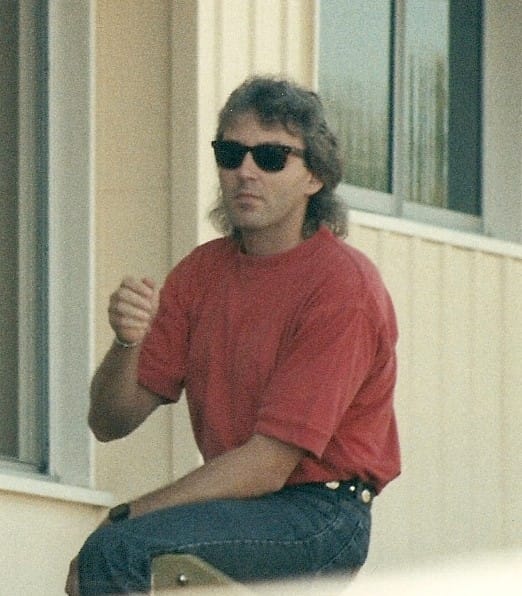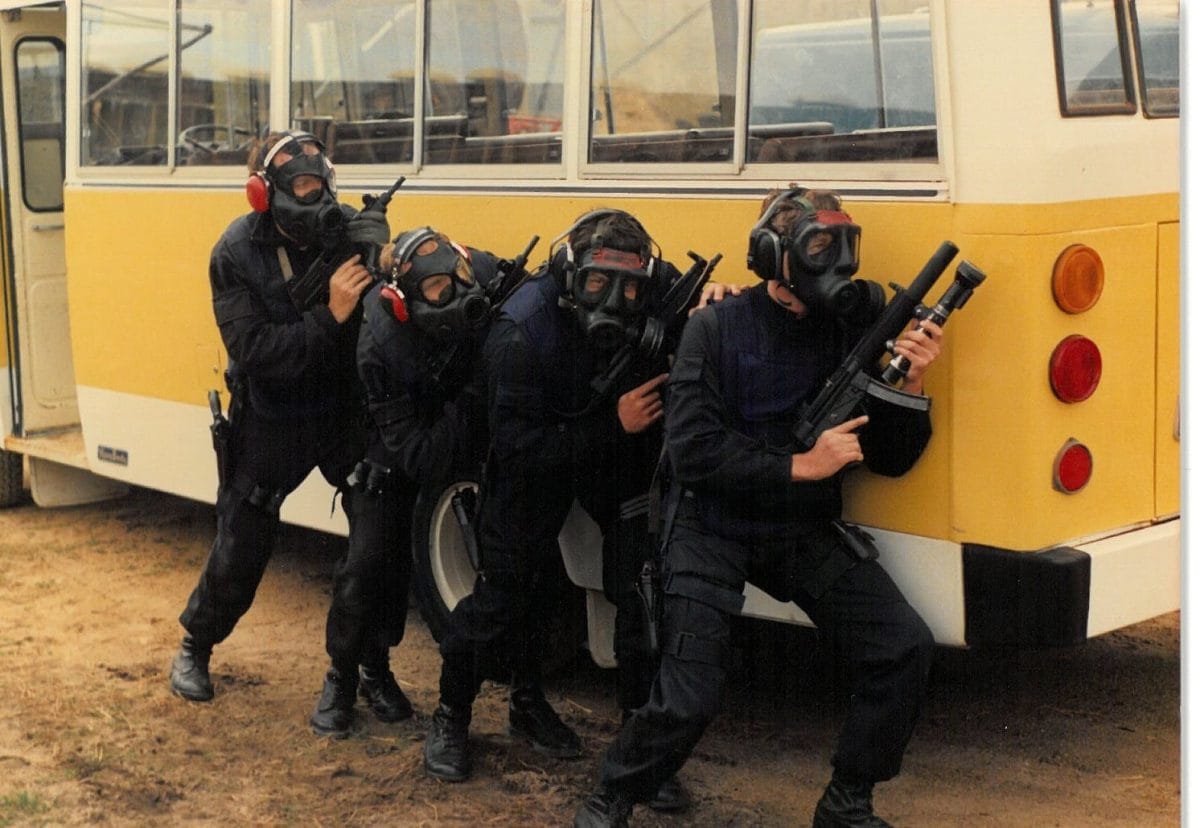FROM UNDERCOVER COP TO LEADERSHIP AND RESILIENCE

What is working undercover like? Think about the most scared you’ve ever been. Then do that 3 times a week for 2 years.
On top of this, you will betray almost everyone you meet.

I grew up in country Queensland, our family moving from town to town wherever the work was. We lived in Tambo, Brisbane, Camooweal, Alice Springs, on a cattle station somewhere in the Gulf, then Mt Isa, Cairns, and finally Charters Towers.
Even as a kid, I knew I wanted to do something that mattered — to protect others from harm and serve a useful purpose.
In 1975, the Queensland Police Cadet system gave me that chance. I lived at the Academy in Brisbane for two years, completing Year 12 and a year of police training — the first step in a twenty-year career. I wanted to change the world, but I wasn’t prepared for how the world would change me.
On 27 May 1977, at just nineteen, I was sworn in as a Queensland Police Constable. For the next decade, Police Commissioner Terry Lewis and Premier Joh Bjelke-Petersen held power — a period now remembered as the most corrupt in Queensland’s history. Lewis would later serve more than ten years in prison, and Bjelke-Petersen’s government was eventually swept from office.
Most of the police I worked with were good, honest people doing their best. But it was a time when trust could be dangerous.
From the start, I was drawn to work outside the norm. When I learned Queensland had an undercover unit, I volunteered immediately and joined the Drug Squad undercover team just before my twenty-second birthday.
There was no training course back then — you learned by doing, often by failing. My days and nights were spent masquerading as a drug dealer, setting up buys, infiltrating networks, and watching arrests unfold. No supervision. Little backup. Often alone. It was terrifying — but it was a rush. And that was the problem…
After two years undercover — and forever changed by it — I returned to uniform duties before joining the Criminal Investigation Branch as a detective. Still restless, I sought new challenges and joined the part-time special weapons team, then known as the Emergency Squad. The squad’s role was to conduct high risk operations including siege response, raids and counter terrorism. In 1987, the unit became full-time and was renamed the Tactical Response Group (TRG). I was appointed as one of its first full-time members.
In July that year, my team was involved in a gun battle with Queensland’s most wanted criminal. One of my teammates was killed, another critically wounded. The offender was shot dead.
There was no counselling or psychological support for police in those days. That day marked the beginning of a long battle with PTSD — a dark relationship that would shape my life in ways I couldn’t yet understand. I knew something was wrong, but PTSD wasn’t recognised then. I hid my struggle behind a confident façade, determined to keep going.
Within two years, I left the tactical role I loved and moved into covert operations and criminal intelligence, later earning promotion to Detective Sergeant. In 1992, I transferred to Major Crime Investigation — drawn again to the unpredictable and high-stakes nature of policing.
In 1993, my colleague and I responded to a siege in Brisbane’s CBD. Inside the building, I came face to face with an army veteran armed with a rifle, a hand grenade, and an improvised explosive device packed with sixteen sticks of gelignite. He intended to kill himself — and anyone nearby. I wasn’t a trained negotiator, but I sat with him for over an hour and a half, talking him down until he finally surrendered. It remains one of the proudest moments of my policing career.





In 1994, I was awarded the Queensland Police Valour Medal and Bar for my actions in 1987 and 1993. The following year, I received the Australian Bravery Medal for my role during the Brisbane siege.
Outwardly, I appeared calm and confident — the steady professional I’d always been. But beneath the surface, I was breaking. The unseen wounds of PTSD were taking their toll, and I knew the job I loved was slowly destroying me. When a corporate opportunity arose, I took it. The anxiety and depression had won.
Handing in my badge and gun in 1995 was one of the hardest things I’ve ever done.
My second career began in the corporate world, as a National Loss and Risk Advisor for Coles Myer.
A lifetime identity was gone. No more treading the thin blue line, no more chasing criminals or protecting the community. The transition was difficult — corporate life wasn’t just a different culture; it was an entirely different universe.
A friend and mentor, also a former police officer, encouraged me to take on postgraduate study even without an undergraduate degree. I embraced it with the same drive and discipline that had defined my policing years. In 2001, I graduated with an MBA — proof that growth is always possible, no matter where you start.
Continuous learning has been a constant in my life ever since.
Over the next several years, I climbed the Coles Myer corporate ladder across multiple business units, but something was missing. I moved into management roles in the security industry, then back to retail as Asia-Pacific Loss & Risk Manager for Borders Books, before returning to security as Australia/New Zealand General Manager. Despite the success, I still felt like an outsider. I couldn’t quite fit within the walls of corporate culture.
The chameleon skills I’d once used as an undercover operative served me well, I was able to adapt to changing environments but I still wasn’t fulfilled.


Eleven years after I had left policing, I had a crippling anxiety attack. No catalyst. I started a path of counselling but couldn’t find the right one to help untangle the layers of trauma I carried. In 2019 — twenty-four years after leaving the Queensland Police — I finally found one. With her guidance, I began to unlock the deep, intertwined wounds of childhood and policing, and was formally diagnosed with chronic Post-Traumatic Stress Disorder.
As part of my own self-directed therapy, and wanting to give my family a deeper understanding of what I’d been living with, I began to write.
My first book, Drugs, Guns and Lies (Allen & Unwin, 2020), told the story of my years as an undercover cop in the 1980s. It became a runaway bestseller.
That experience — translating trauma into words — became its own form of healing. It led to my second book, Gun to the Head (Allen & Unwin, 2022), a raw and honest account of my tactical response role, the subsequent battle with PTSD and the long road to recovery.
The success of my books opened a platform for something far greater: to speak openly about mental health and trauma, and to serve those who continue to carry invisible wounds. Through my keynote speaking and advocacy, I help first responders and others affected by trauma find connection, strength, and the understanding that they are never alone.
As part of that purpose, I also serve as a volunteer Peer Support Officer with Police Veterans Victoria, supporting veteran police through times of crisis and helping them find their way back to hope.
In 2022, my final corporate role ended due to a company restructure and redundancy. Rather than grieving another loss of identity, I saw it as an opportunity — a catalyst for post-traumatic growth. It was a chance to redefine purpose, find meaning in the experiences that once broke me, and dedicate myself fully to advocacy, recovery, and helping others lead fulfilling lives.
Throughout my adult life, martial arts has been my constant anchor. It’s more than a discipline — it’s therapy. Stepping into a dojo allows me to reconnect with my tribe, focus on shared purpose, and simply breathe. I train in two dojos and currently hold second dan and third dan black belts.
My commitment to lifelong learning continues through both formal and informal training in mental health support. By combining that knowledge with my lived experience, I strive to share a genuine story of hope — one that motivates, inspires, and empowers others.
Today, I speak to corporate audiences about mental health, resilience, and what I call the superannuation of the mind — preparing for life’s inevitable challenges before they arrive. I also deliver training for leaders and organisations seeking to build stronger, more empathetic teams.
My advocacy extends through mainstream and social media, where I inform, connect, and occasionally entertain. My story has been featured in two episodes of Australian Crime Stories – The Investigators (Nine/9Now/Binge). As well as appearing on SBS Insight, I’ve also appeared on reality TV’s Traitors (Paramount/10) and have written for The Age newspaper in Melbourne.
I’m married with two adult daughters and am deeply grateful for the unwavering love and support of my family.
And yes — I’m also an unashamed Bruce Springsteen tragic.



